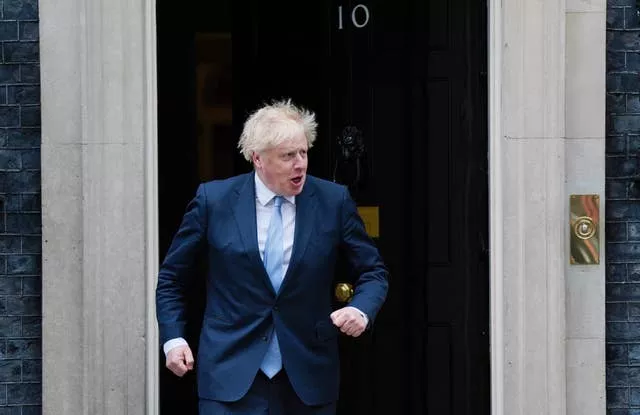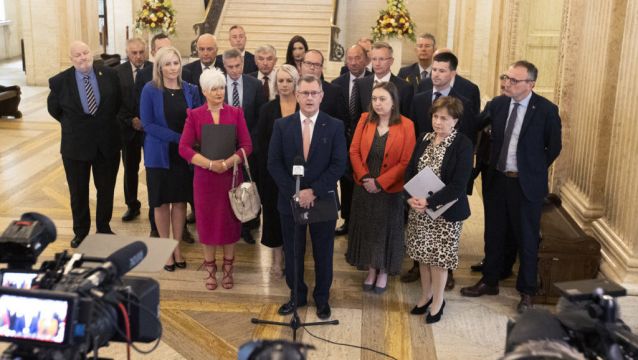British prime minister Boris Johnson is set to visit Northern Ireland on Monday amid a political crisis caused by the DUP blocking the election of a Speaker for the Northern Ireland Assembly, Sinn Féin vice president Michelle O’Neill has said.
The DUP leader, Sir Jeffrey Donaldson, has insisted he is sending a “clear message” to the EU and the UK government about resolving issues with the Northern Ireland Protocol.
But Ms O’Neill accused the unionist party of “punishing the electorate” while Alliance Party leader Naomi Long said it had been a “shameful day” for the DUP.
The failure to elect a Speaker leaves the Stormont Assembly unable to function.
The 90 MLAs met for the first time in Stormont on Friday after last week’s election saw Sinn Féin emerge as the largest party for the first time.
The first order of business was for MLAs to sign the roll of membership before an attempt was made to elect a Speaker. Two candidates, Mike Nesbitt of the UUP, and Patsy McGlone, of the SDLP, were nominated but did not receive the necessary support.
The DUP is also refusing to nominate for the position of deputy first minister, which prevents the forming of a new executive, as part of its protest against the protocol.

Ms O’Neill said the DUP has “punished the electorate” by boycotting the election of a speaker of the Northern Ireland Assembly, and that “the public deserve better”.
Speaking to reporters in the Great Hall after the Assembly was adjourned, Ms O’Neill said the DUP’s action to boycott the election of an Assembly speaker “isn’t tolerable, it isn’t acceptable, it isn’t good enough”.
Ms O’Neill also announced that Sinn Féin MLA for Upper Bann John O’Dowd would be taking up the role of Infrastructure Minister in a caretaker capacity, after the former minister Nichola Mallon of the SDLP lost her seat in last week’s election.
She also confirmed that Mr Johnson would be visiting Northern Ireland on Monday.
Speaking in the Great Hall, a visibly angry Mrs Long said: “Despite the fact that the vast majority of people in Northern Ireland voted for parties that wanted to return to government, that wanted to see the Assembly work, and despite the fact that even those who voted for the DUP gave them no mandate to block a return to the Assembly, we have found ourselves in that situation today.
“But while this is a sad day for the people of Northern Ireland, it is a shameful day for the DUP.
“The day the DUP came to Stormont, signed the register, took their salaries but refused to take their seats and do the work to earn it.

“I don’t think that is ever acceptable but it is particularly unacceptable when people in our constituencies are struggling to feed their families, struggling to heat their homes, worried for their futures and it puts all of us as politicians in a place which is embarrassing once again.
“We want to serve the public but are prevented from doing so.”
Speaking earlier, Mr Donaldson said: “As I have made clear this morning we have taken the decision not at this stage to support the election of a speaker.
“I believe that we need to send a very clear message to the European Union and to [the UK] government that we are serious about getting this protocol sorted out.
"Because of the harm it is doing, undermining political stability, damaging the agreements that have formed the basis of political progress made in Northern Ireland, to our economy, contributing to the cost-of-living crisis, this matter needs to be dealt with."
He added: “The choice is clear: if the European Union is serious about protecting the political institutions and the Belfast [Good Friday] Agreement, and its successor agreements, then they know what to do.'
"Equally the same message is there for [the UK] government as well."

During the plenary session, Ms O’Neill told MLAs the public is hoping that Northern Ireland’s elected parties have “the maturity and courage” to take responsibility, adding that “there is absolutely no reason we should be in a rolling crisis, even for one second”.
It is the job of politicians to “properly fund” the healthcare service and to agree a three-year budget and invest in the health service, Ms O’Neill said.
“This is our hour of decision, not tomorrow, and not for a moment longer can the DUP deny democracy, punish the public, boycott this Assembly and executive, and prevent us from putting money in people’s pockets.
“Every one party in this chamber told the electorate that they would turn up on day one. Well, the DUP have failed on day one.”
Today is the day we should be forming an Executive to put money in peoples pockets and to start to fix our health service. The DUP have confirmed they will punish the public and not turn up. They are disgracefully holding the public to ransom for their Brexit mess. Shameful.
— Michelle O’Neill (@moneillsf) May 13, 2022
Mr Donaldson was not in the chamber for the first Assembly meeting as he has chosen to retain his position as a British MP, despite being elected as an MLA for Lagan Valley a week ago.
Welcome aboard @little_pengelly Thank you for stepping up to cover this interim period. Lagan Valley is a great constituency to represent. https://t.co/UQGp1H7EPN
— Jeffrey Donaldson MP (@J_Donaldson_MP) May 12, 2022
Instead, former party MP Emma Little-Pengelly has been co-opted to replace her leader on the Stormont benches.
As the largest party, the 27 Sinn Féin MLAs took their position on the benches on the right-hand side of the Speaker’s chair for the first time.
It is entitled to nominate its Stormont leader Michelle O’Neill as first minister, but she will not be able to take up the role without the DUP nominating a deputy first minister.
Under the rules of the devolved power-sharing administration, both roles are equal and one cannot be in office without the other.
Since last week’s election, Ms O’Neill has repeatedly called for the DUP to re-enter the executive so it can begin to tackle challenges such as the cost-of-living crisis and spiralling hospital waiting lists.
The Stormont sitting comes amid increased tensions between the UK government and the EU over the working of the protocol, which forms part of the UK’s Withdrawal Agreement with the EU.







